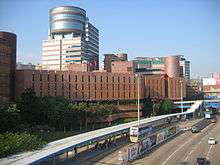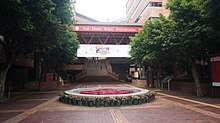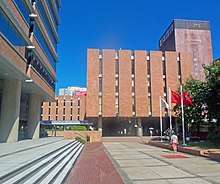Hong Kong Polytechnic University
|
香港理工大學 | |
 | |
| Motto | 開物成務 勵學利民[1] |
|---|---|
Motto in English | To learn and to apply, for the benefit of mankind[2] |
| Type |
public statutory |
| Established | 1937 (granted full university status in 1994) |
| Chairman | Chan Tze-ching |
| Chancellor |
Chief Executive of Hong Kong (Current officeholder: Carrie Lam) |
| President | Prof. Timothy W. Tong |
Academic staff | 1,233 |
| Students | 32,000 |
| Location | Hung Hom, Kowloon, Hong Kong |
| Campus | Urban, Around 9.46 hectares [3] |
| Colours | [4] |
| Website | Official website |
 | |
| Hong Kong Polytechnic University | |||||||||||||
| Traditional Chinese | 香港理工大學 | ||||||||||||
|---|---|---|---|---|---|---|---|---|---|---|---|---|---|
| Simplified Chinese | 香港理工大学 | ||||||||||||
| Cantonese Yale | Hēunggóng Léihgūng Daaihhohk | ||||||||||||
| |||||||||||||


The Hong Kong Polytechnic University (PolyU) is a public university located in Hung Hom, Hong Kong. The history of PolyU can be traced back to 1937, and it assumed full university status in 1994. It is one of the funded institutions of the territory's University Grants Committee (UGC).
PolyU has an international faculty and student community and has developed a global network with more than 440 institutions in 47 countries and regions. PolyU offers 220 postgraduate, undergraduate and sub-degree programmes for more than 32,000 students every year. It is the largest UGC-funded tertiary institution in terms of number of students.
History
The Government Trade School was founded in 1937. Situated at Wood Road, Wan Chai, the school was the first publicly funded, post-secondary technical institution in Hong Kong. After World War II the school became the Hong Kong Technical College, and in 1957 opened new premises in Hung Hom.
In 1972 The Hong Kong Polytechnic was formally established. Its mandate was to provide professionally oriented education to meet the need for qualified staff. It gained approval from the University and Polytechnic Grants Committee for self-accreditation of degree programmes on 25 November 1994, assuming full university status and changing its name to The Hong Kong Polytechnic University.
Reputation & Rankings
| University rankings | |
|---|---|
| Global | |
| ARWU World[5] | 201-300 |
| Times World[6] | 182 |
| QS World[7] | 106 |
| Regional | |
| Times Asia[8] | 17 |
| QS Asia[9] | 29 |
World Rankings of PolyU
- QS "Top 50 Under 50" list of world's top young universities (2016/17): 6th in the world, 3rd in Hong Kong[10]
- QS Asian University Rankings 2016/17: 6th in Asia, 5th in Hong Kong
- QS World University Rankings 2018: 95th in the world, 5th in Hong Kong
- Times Higher Education's World University Rankings 2017: 192nd in the world
- Times Higher Education's 150 Under 50 World University Rankings 2016: 27th in the world
- Times Higher Education's Asia University Rankings 2017: 17th in the Asia, 5th in Hong Kong
World Rankings of Faculties, Schools and Disciplines
| Faculty of Applied Science and Textiles |
|
| Faculty of Business |
|
| Faculty of Construction and Environment |
|
| Faculty of Engineering |
|
| Faculty of Humanities |
|
| School of Nursing | 35th in the QS World University Rankings by Subject 2018. |
| School of Design |
|
| School of Hotel and Tourism Management |
|
Faculties and schools
The University's teaching units are grouped under 8 faculties and schools, offering over 220 postgraduate, undergraduate and sub-degree programmes. The service learning subjects are offered by 20 departments from 8 faculties and schools, covering a variety of community service projects.
| Faculty of Applied Science and Textiles | Faculty of Business | Faculty of Construction and Environment |
|---|---|---|
|
|
|
| Faculty of Engineering | Faculty of Health and Social Sciences | Faculty of Humanities |
|
|
|
| School of Design | School of Hotel and Tourism Management | College of Professional and Continuing Education (CPCE) |
Bachelor's
Master's
Executive Education
|
|
Research
There are more than 2,700 ongoing research projects conducting by PolyU's faculties and schools, with over HK$1,500 million funding from research grants and external funds. PolyU receives international recognition for its inventions. It has won more than 200 awards, including nearly 70 Gold Awards in international invention expos held in Belgium, the Chinese mainland, Germany, Korea, Switzerland and the United Kingdom since 2001.
In order to promote and encourage specialized research, various research centres have been set up at PolyU.[14] Each faculty or school has its own centres, and institutes for public policy research and sustainable urban development operate under the Areas of Excellence Committee. With Boeing, PolyU established the Aviation Services Research Centre.[15] It also hosts The Hong Kong Research Institute of Textiles and Apparel.[16]
Projects
Notable PolyU research projects include:[17]
- Safety monitoring of high speed rail
- Defocus Incorporated Soft (Contact) (DISC) Lens
- Eco-blocks (a construction material made from recycled glass and demolition waste)
- Electric vehicles
- Electronic “bat ears” for the visually impaired
- "Hand of Hope" technology (potentially useful in rehabilitation following stroke)
- Life-cycle health monitoring of massive infrastructure
- Micro-injection moulding machine
- Nano-particles for purifying dirty water
- Nu-Torque singles yarn technology
- Organic photovoltaics and LEDs
- Tools and instruments used in space exploration
Campus


PolyU's main campus has over 20 buildings, many of which are inter-connected. Apart from those named after donors, the buildings are identified in English letters (from blocks A to Z, without blocks K, O and I). In addition to classrooms, laboratories and other academic facilities, the university provides student hostels, a multi-purpose auditorium, sports, recreational and catering facilities, as well as a bookstore and banks.
The Jockey Club Innovation Tower is located at the northeastern side of the University campus. This 15-story building provides 15,000 square metres of net floor area. It houses facilities for design education including exhibition areas, multi-functional classrooms and lecture theatres, design studios and workshops, as well as a communal lounge. The tower was designed by Zaha Hadid.
The Jockey Club Auditorium began operation in 2000. Its balcony and main floor seating accommodate up to 1,084 persons.
Hotel Icon was officially opened in September 2011. Wholly owned by PolyU, Hotel ICON is the teaching and research hotel of the School of Hotel and Tourism Management.
Pao Yue-kong Library
The library was established on 1 August 1972.[18] Two centres operated until 1976 at Hung Hom and Quarry Bay, merging into the present building in 1976. The library was named after shipping entrepreneur and philanthropist Yue-Kong Pao in 1995.
In 2014, there are over 2.77 million of library holdings in total, with nearly 600,000 electronic resources. The six-storey library provides 3,900 study spaces and is equipped with a 24-hour study centre and audio-visual information areas. It opens from 8:30am to 11pm from Mondays to Saturdays and 12:00nn to 10pm on Sundays.
Hong Kong Community College Campuses (HKCC)
Established in 2001 under the auspices of PolyU, the Hong Kong Community College (HKCC) is a self-financed post-secondary institution which offers associate degree and higher diploma programmes spanning the domains of arts, science, social sciences, business, health care and design for senior secondary school leavers. HKCC classes are conducted on Hung Hom Bay Campus and West Kowloon Campus. With a floor area totalling over 57,000 square metres, the two campuses provide teaching and recreational facilities, including lecture theatres, classrooms, a library, a computer centre, multi-purpose rooms and halls, sky gardens, a cafeteria and communal areas. Since its establishment, HKCC has helped over 13,700 graduates matriculate into bachelor’s degree programmes.
Facilities
- Recreational Facilities
- Amenities centres (Shaw Amenities Building and Communal Building)
- Student leisure rooms, open-air plaza facilities for reading, watching TV and organizing events, etc.
- Cultural facilities
- Sports Facilities
- 1 swimming pool (Michael Clinton Swimming Pool)
- 2 indoor sports grounds (Shaw Sports Complex and Kwong On Jubilee Sports Centre) for playing badminton, volleyball or basketball and gymnastic facilities
- 1 outdoor sports ground (Keith Legg Sports Field) with basketball and soccer fields and jogging track
- 2 outdoor tennis courts located at the roof-top of Shaw Sports Complex
- 1 Joint Sports Centre
- Catering Facilities
Within the campus, there are a total of 12 catering outlets comprising Student Canteens, Staff Canteen, Student/Staff Restaurants, Theatre Lounge and cafés, providing about 3,000 seats.
The canteens and cafés cater for the basic needs of students and staff for meals.
The restaurants and Theatre Lounge provide higher grade services.
Student life
- Student Halls
- Student Halls of Residence (Hung Hom Bay)
Located at 1 Hung Lai Road in Hung Hom, Student Halls of Residence (Hung Hom Bay) has 9 Halls altogether in a 22-storey building. Boyan Hall (19,20/F) is for Research Postgraduate students only. The other halls are Kaiyuan Hall (17,18/F), Wuhua Hall (15,16/F), Chengde Hall (13,14/F), Wuxian Hall (11,12/F), Lizhi Hall (9,10/F), Lisheng Hall (5,6/F), Minyin Hall (3,4/F)and Xuemin Hall (7,8/F)are for undergraduates, with Xuemin Hall designated for female residents only.
- Student Halls of Residence (Homantin)
Located at 15 Fat Kwong Street in Homantin, Student Hall of Residence (Homantin) has 6 Halls altogether in a 26-storey building. Named in colours, all Halls are co-ed halls for both research postgraduate and undergraduate students.
- Off-Campus Housing - The University-managed off-campus housing sites offer some 250 residential places at prime urban areas, as an accommodation option, for non-local students, pursuing self-financed taught postgraduate or SYSU undergraduate programmes.
- Siuching Mansion, 201-207 Yu Chau Street, Sham Shui Po
- Hung Kwan House, 76 Shan Tung Street, Mongkok
- Chun Fook Mansion, 1 Hillwood Road, Tsimshatsui
- Student Organization
The Hong Kong Polytechnic University Students’ Union (HKPUSU) is a student-run organization that is autonomous from the University administration for promoting the interests and welfare of full-time undergraduates (excluding postgraduate and College of Professional and Continuing Education students).
- PolyU Sports Teams
- Athletics
- Badminton
- Basketball
- Fencing
- Handball
- Karate-do
- Rowing
- Rugby
- Soccer
- Squash
- Swimming
- Table Tennis
- Taekwondo
- Tennis
- Volleyball
- Woodball
Notable alumni
References
- ↑ "校訓、願景及使命 (Chinese)". HK Polytechnic U. Retrieved 2014-07-17.
- ↑ "Motto, Vision and Mission (Chinese)". HK Polytechnic U. Retrieved 2014-07-17.
- ↑ "About the Campus – The Hong Kong Polytechnc University". Retrieved 2 April 2013.
- ↑ "The Hong Kong Polytechnic University – Identity Guidelines". Yale.edu. Retrieved 4 December 2011.
- ↑ "ARWU World University Rankings 2017 - Academic Ranking of World Universities 2017 - Top 500 universities - Shanghai Ranking - 2017". www.shanghairanking.com. Retrieved 14 March 2018.
- ↑ "World University Rankings". 18 August 2017. Retrieved 14 March 2018.
- ↑ "QS World University Rankings 2018". 5 June 2017. Retrieved 14 March 2018.
- ↑ "Asia University Rankings". 14 March 2017. Retrieved 14 March 2018.
- ↑ "QS University Rankings: Asia 2016". 5 November 2015. Retrieved 14 March 2018.
- ↑ "QS University Rankings: Top 50 Under 50 2016".
- ↑ "The UTD Top 100 Worldwide Business School Rankings Based on Research Contributions (All Journals)".
- ↑ "A World Ranking of the Top 100 Hospitality and Tourism Programs" (PDF).
- ↑ "School of Nursing". The Hong Kong Polytechnic University.
- ↑ http://www.polyu.edu.hk/web/sc/research/research_institutes_research_centres/index.html HKPU Research Website
- ↑ "About". The Aviation Services Research Centre. Retrieved 9 December 2014.
- ↑ "About HKRITA". Hong Kong Research Institute of Textiles and Apparel. Archived from the original on 9 December 2014. Retrieved 9 December 2014.
- ↑ "Impactful projects". The Hong Kong Polytechnic University. Retrieved 9 December 2014.
- ↑ "History". Lib.polyu.edu.hk: The University Learning Hub. Retrieved 2014-12-09.
External links
| Wikimedia Commons has media related to The Hong Kong Polytechnic University. |